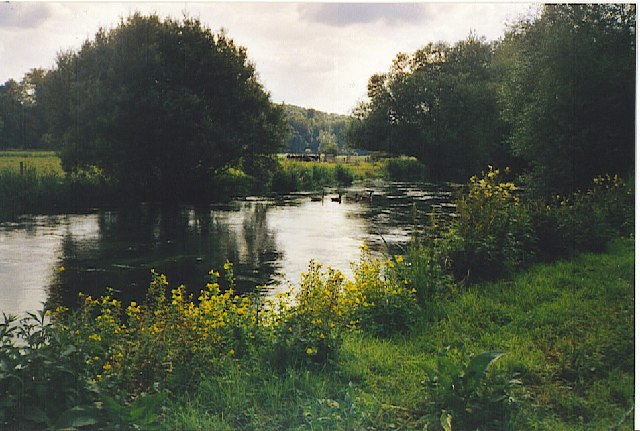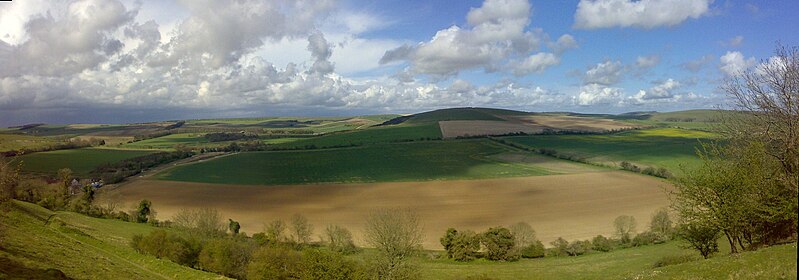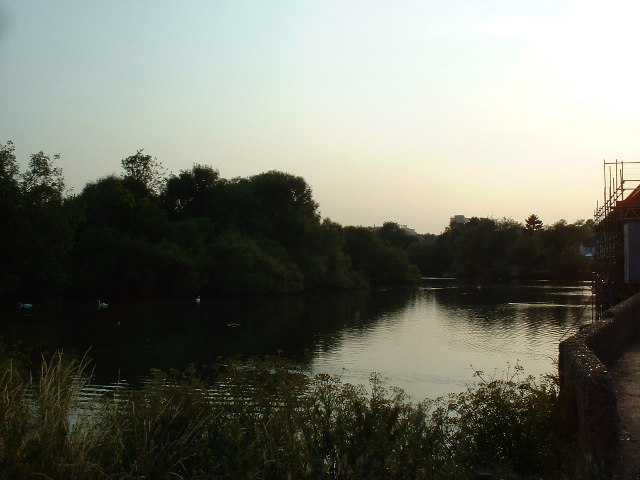.
Sparsholt Road, Hampshire. Field and copse by Sparsholt Road, west of Pitt. Looking north: photo by Peter Jordan, 19 November 2005
- John Keats to George and Georgiana Keats, Winchester, 21 September 1819:
- Some think I have lost that poetic ardour and fire ’tis said I once had—the fact is, perhaps I have; but, instead of that, I hope I shall substitute a more thoughtful and quiet power. I am more frequently now contented to read and think, but now and then haunted with ambitious thoughts. Quieter in my pulse, improved in my digestion, exerting myself against vexing speculations, scarcely content to write the best verses for the fever they leave behind. I want to compose without this fever. I hope I one day shall. You would scarcely imagine I could live alone so comfortably. “Kepen in solitarinesse.” I told Anne, the servant here, the other day, to say I was not at home if any one should call. I am not certain how I should endure loneliness and bad weather together. Now the time is beautiful. I take a walk every day for an hour before dinner, and this is generally my walk: I go out the back gate, across one street into the cathedral yard, which is always interesting; there I pass under the trees along a paved path, pass the beautiful front of the cathedral, turn to the left under a stone doorway,—then I am on the other side of the building,—which leaving behind me, I pass on through two college-like squares, seemingly built for the dwelling-place of deans and prebendaries, garnished with grass and shaded with trees; then I pass through one of the old city gates, and then you are in one college street, through which I pass, and at the end thereof crossing some meadows, and at last a country alley of gardens, I arrive, that is my worship arrives, at the foundation of St. Cross, which is a very interesting old place, both for its gothic tower and alms square and for the appropriation of its rich rents to a relation of the Bishop of Winchester. Then I pass across St. Cross meadows till you come to the most beautifully clear river—now this is only one mile of my walk. I will spare you the other two till after supper, when they would do you more good. You must avoid going the first mile best after dinner—
- John Keats to John Hamilton Reynolds, Winchester, 22 September 1819:
- My dear Reynolds—I was very glad to hear from Woodhouse that you would meet in the country. I hope you will pass some pleasant time together. Which I wish to make pleasanter by a brace of letters, very highly to be estimated, as really I have had very bad luck with this sort of game this season. I “kepen in solitarinesse,” for Brown has gone a-visiting. I am surprised myself at the pleasure I live alone in. I can give you no news of the place here, or any other idea of it but what I have to this effect written to George. Yesterday I say to him was a grand day for Winchester. They elected a Mayor. It was indeed high time the place should receive some sort of excitement. There was nothing going on: all asleep: not an old maid’s sedan returning from a card party: and if any old woman got tipsy at Christenings they did not expose it in the streets. The first night though of our arrival here, there was a slight uproar took place at about 10 o’ the Clock. We heard distinctly a noise pattering down the High Street as of a walking cane of the good old Dowager breed; and a little minute after we heard a less voice observe “What a noise the ferril made—it must be loose.” Brown wanted to call the constables, but I observed ’twas only a little breeze and would soon pass over.—The side streets here are excessively maiden-lady-like: the door-steps always fresh from the flannel. The knockers have a staid serious, nay almost awful quietness about them. I never saw so quiet a collection of Lions’ and Rams’ heads. The doors are most part black, with a little brass handle just above the keyhole, so that in Winchester a man may very quietly shut himself out of his own house. How beautiful the season is now—How fine the air. A temperate sharpness about it. Really, without joking, chaste weather—Dian skies—I never liked stubble-fields so much as now—Aye better than the chilly green of the Spring. Somehow, a stubble-field looks warm—in the same way that some pictures look warm. This struck me so much in my Sunday’s walk that I composed upon it.
Season of mists and mellow fruitfulness,
Close bosom-friend of the maturing sun;
Conspiring with him how to load and bless
With fruit the vines that round the thatch-eves run;
To bend with apples the moss'd cottage-trees,
And fill all fruit with ripeness to the core;
To swell the gourd, and plump the hazel shells
With a sweet kernel; to set budding more,
And still more, later flowers for the bees,
Until they think warm days will never cease,
For summer has o'er-brimm'd their clammy cells.
Who hath not seen thee oft amid thy store?
Sometimes whoever seeks abroad may find
Thee sitting careless on a granary floor,
Thy hair soft-lifted by the winnowing wind;
Or on a half-reap'd furrow sound asleep,
Drows'd with the fume of poppies, while thy hook
Spares the next swath and all its twined flowers:
And sometimes like a gleaner thou dost keep
Steady thy laden head across a brook;
Or by a cyder-press, with patient look,
Thou watchest the last oozings hours by hours.
Where are the songs of spring? Ay, Where are they?
Think not of them, thou hast thy music too,—
While barred clouds bloom the soft-dying day,
And touch the stubble-plains with rosy hue;
Then in a wailful choir the small gnats mourn
Among the river sallows, borne aloft
Or sinking as the light wind lives or dies;
And full-grown lambs loud bleat from hilly bourn;
Hedge-crickets sing; and now with treble soft
The red-breast whistles from a garden-croft;
And gathering swallows twitter in the skies.
John Keats (1795-1821): To Autumn, 19 September 1819, from Poems, 1820

The River Itchen, a chalk stream in the Hampshire Downs near Winchester. The stream is shallow, slow flowing, and has much long grass growing on the river bed: photo by Colin Smith, June 2000
The River Itchen at Woodmill. Looking South West along the River Itchen from Woodmill Bridge on a fine summer's evening: photo by GaryReggae, 13 July 2005

View across the water meadows towards St Cross. The view here is from the east bank of the Itchen Navigation, across the water meadows of the Itchen valley, towards the huge chapel at St Cross Hospital: photo by Jim Champion, 20 November 2005

Panoramic view on South Downs in southern England, as seen from Angmering Park Estate near Arundel: photo by Gottik666, 13 April 2008





No comments:
Post a Comment